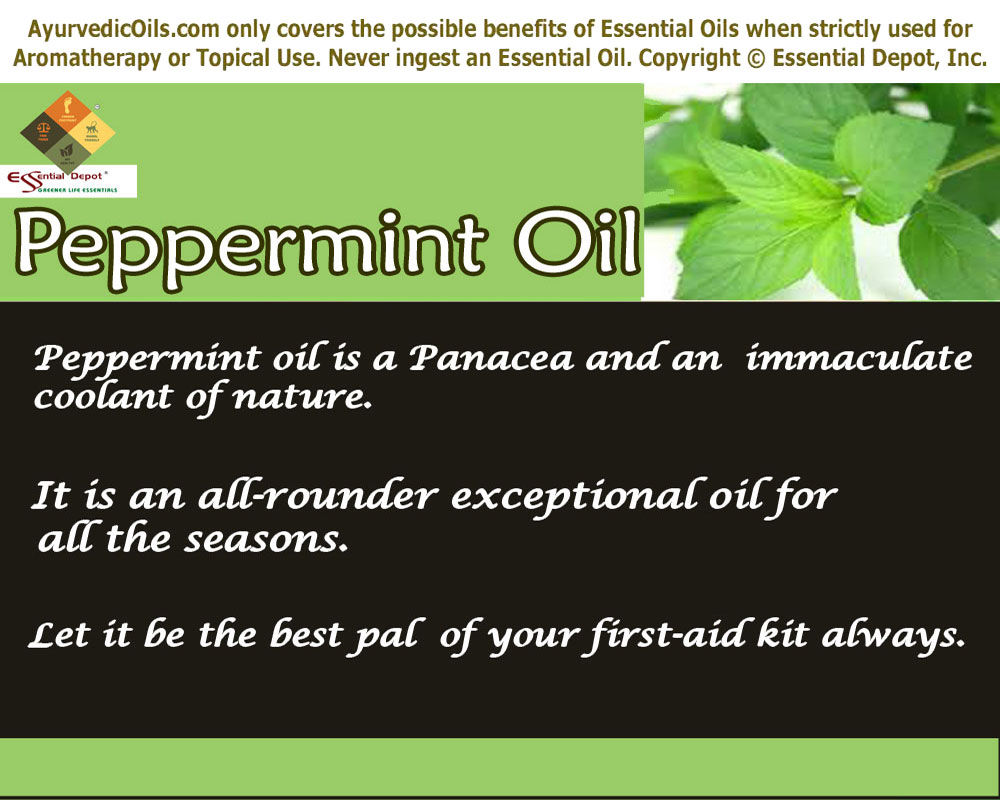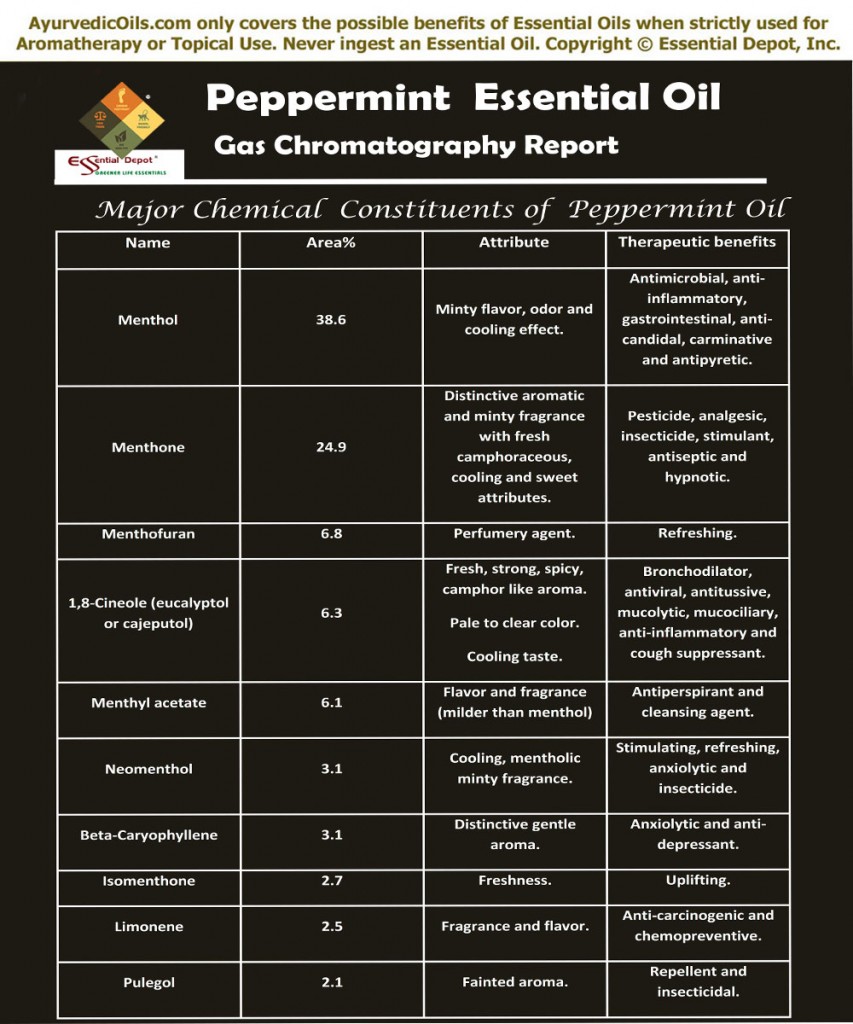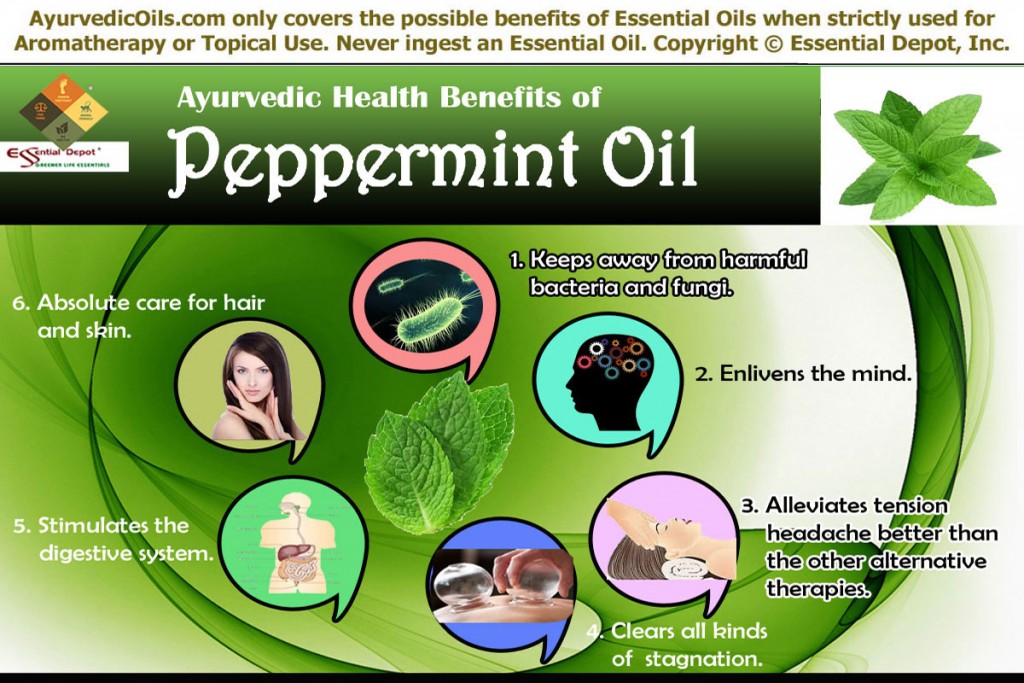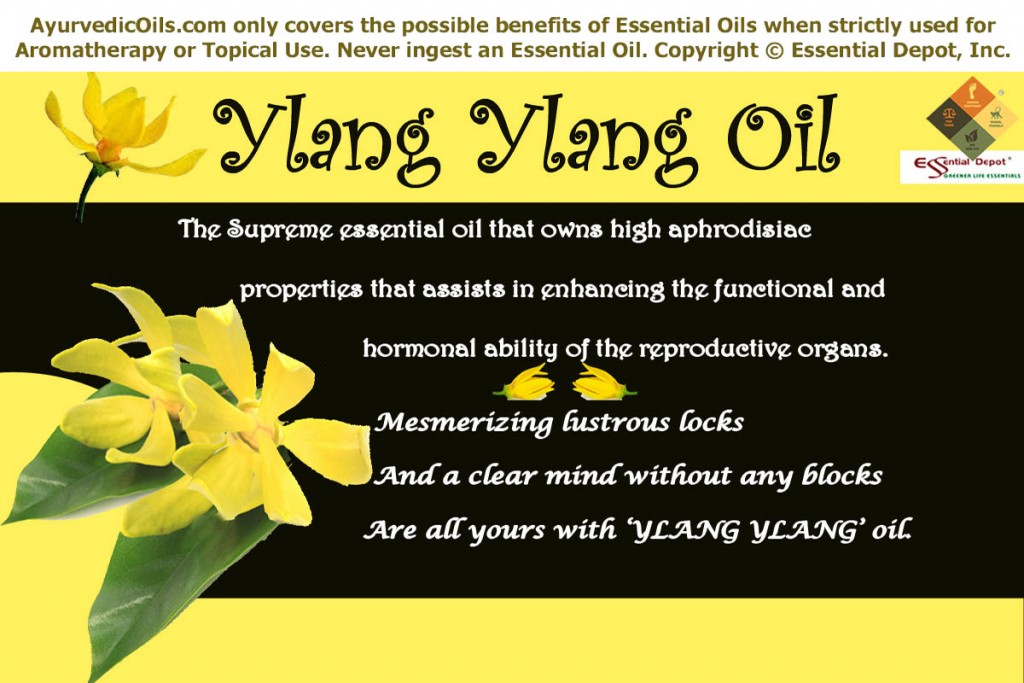 Ylang Ylang essential oil is an eminent value addition to the perfume and cosmetic industry. Not many of us knew this name a few decades back and thanks to the cosmetic industry that has spread the magic of this herb just like forest fire.
Ylang Ylang essential oil is an eminent value addition to the perfume and cosmetic industry. Not many of us knew this name a few decades back and thanks to the cosmetic industry that has spread the magic of this herb just like forest fire.
The use of Ylang Ylang and its oil can be attributed to the ancient times as historical references indicate the use of aromatic plants by mankind for more than thousands of years. The essential oil of Ylang Ylang has innumerable Ayurvedic health benefits that you will certainly be amazed at.
Purchase Ylang Ylang Essential Oil – Retail – CLICK HERE
Purchase Ylang Ylang Essential Oil – Wholesale – CLICK HERE
Historical uses and importance of Ylang Ylang oil:
Popularly known as the flower of flowers, all the parts of the Ylang Ylang tree has a celebrated history both in the West and the East. This tree is indigenous to Indo-Malaysia, Philippines and Java. It was used in salves to heal cuts, scrapes, insect bites, snake bites and few other skin disorders in Philippines.
The Ylang Ylang petals are spread over the bed of newly married couples in Indonesia for its mesmerizing aroma and sensual effects.
The essential oil of Ylang Ylang was used in making of antimacassar, an ornamental chair cover that prohibited the Macassar oil from discoloring the upholstery. This oil was also used as a prominent ingredient in Macassar oil, an effective hair pomade.
Ylang Ylang was also used as a medicinal herb in treating chronic disorders like typhus, malaria and intestinal infections. Few sources reveal that the prominent therapeutic properties were initially identified in the early 20th century by famous French chemists Rechler and Garnier on the Reunion Island.
Every part of the Ylang Ylang tree is used for various purposes and the entire tree is claimed to be highly beneficial in many ways. The people of Java use the paste of fresh flowers to treat asthma and the dried flowers to treat malaria.
In Samoa and Tonga, the bark of the Ylang Ylang tree is used as a laxative and to treat stomach disorders. The timber of this tree is used in canoe making and construction works. In Cook Islands this timber is used for making furniture, wooden shoes, crates, fishnet floats and lathe turnings. Ylang Ylang is considered as a culturally important and as a sacred tree.
Chemical constituents or Gas Chromatography Report (GC) of Ylang Ylang oil:
According to the Gas chromatography report, Ylang Ylang oil is constituted of about 8 major chemical components that add to the aroma, consistency, quality and therapeutic values of this essential oil.
Just click on:
- Benzyl acetate
- Linalool
- Benzyl salicylate
- Geranyl acetate
For knowing more about the exclusive information of these key constituents of Ylang Ylang oil.
The table below on the Gas Chromatography report talks about the principal chemical constituents and its role in granting the therapeutic and other attributes to Ylang Ylang oil.
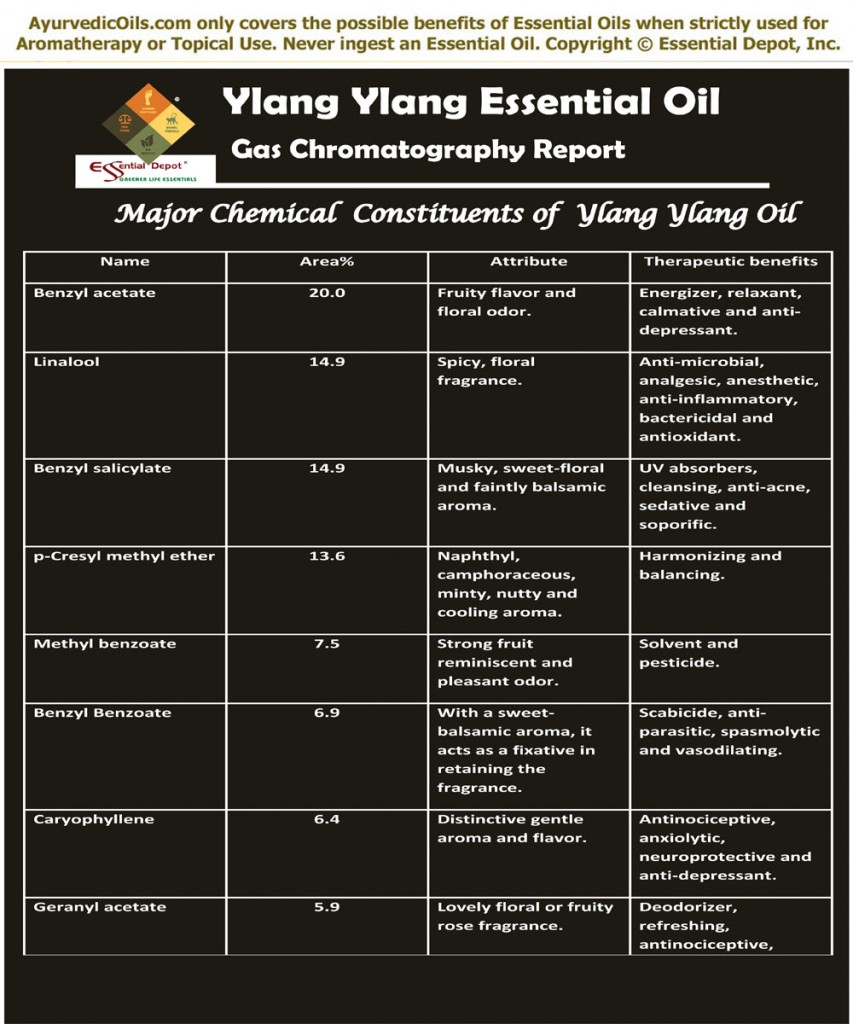 Ayurvedic health benefits of Ylang Ylang essential oil:
Ayurvedic health benefits of Ylang Ylang essential oil:
The most incredible thing about Ayurveda is that it considers every individual as a ‘unique person’ with special individual constitution known as doshas. Ayurveda considers illness as a sign of imbalance in the system as Ayurvedic philosophy states that ideal health can be attained only by having a strong immune system and is a symbol of perfect harmony between a person’s mental, physical and spiritual wellness.
This ancient methodology trusts in treating mankind with the theory of five senses namely vision, smell, taste, touch and sound through colors, aroma, herbs, Abhyanga or Ayurvedic massage with essential oils and music respectively.
Essential oils are highly concentrated liquids extracted from plants using steam distillation. Every individual has a unique combination of three doshas (metabolic principles controlling mind and body) known as vata, pitta and kapha and the individual’s character, personality and health is often determined by the predominance of any of these dosha types. Imbalance of doshas acts as the basis of diseases where,
- Vata imbalance causes weak memory, insomnia, dry skin, constipation and anxiety.
- Pitta imbalance causes heartburn, acne, anger, indigestion, excess perspiration and criticism.
- Kapha imbalance leads to obesity, respiratory disorders, water retention, sluggishness, possessiveness and uncaring.
With gentle, uplifting and moisturizing properties, Ylang Ylang essential oil is suitable in treating vata and pitta imbalances like frigidity, impotence, acne, boils, dry skin, wrinkles and skin irritations.
In their popular book ‘Ayurveda and Aromatherapy’, Light Miller and Bryan Miller say that individuals with imbalanced vata need warming up, calmness, relaxation, boost in self-esteem, sensuality for an attached life with their partner and using aphrodisiac essential oils like Ylang Ylang aids in augmenting the functional and hormonal ability of the sex organs.
People with pitta imbalance need help for venting out their anger and unwanted tension to experience their elated personality. Essential oils extracted from flowers like Ylang Ylang helps in supporting such conditions with their calming and cooling tendency.
The Ayurvedic health benefits of Ylang Ylang essential oil are:
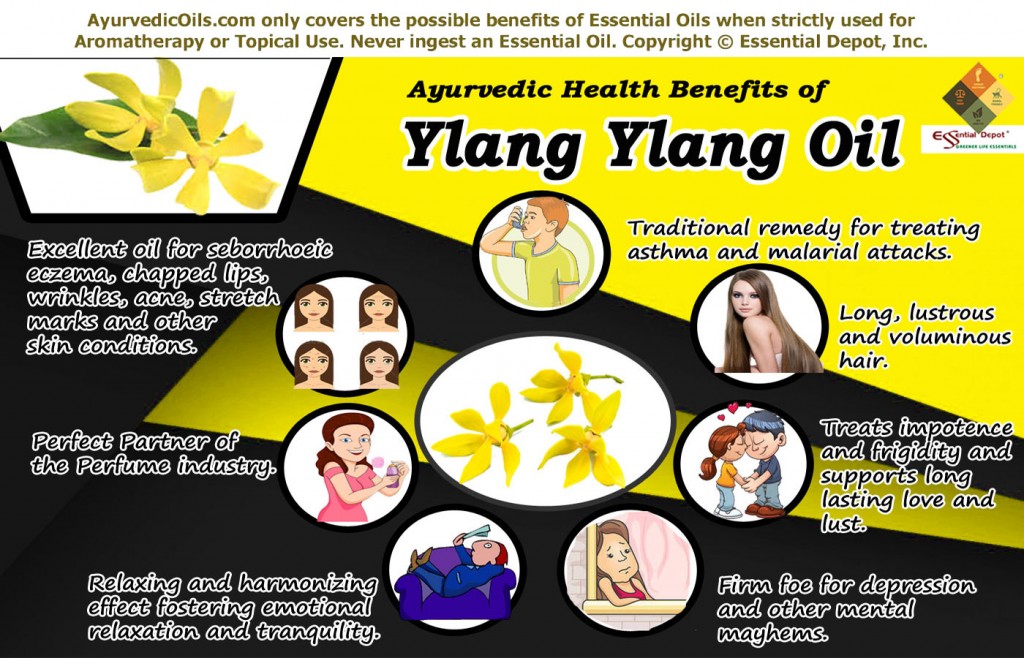 1. Excellent oil for skin care:
1. Excellent oil for skin care:
Ylang Ylang essential oil is very effective and versatile in toning and stimulating the skin cells mainly because of its power to balance the production of sebum, making it suitable for all types of skin and as a promising remedy for treating Seborrhoeic Eczema.
The soothing, anti-seborrhoeic and antiseptic properties of this oil supports in treating skin inflammation, boils, skin irritation, chapped lips, acne, wounds, burns, blemishes, wrinkles, dry skin and few other signs of aging. Adding few drops of Ylang Ylang oil in your skin care lotion will help you in retaining the moisture of the skin, leaving it healthy and glowing.
2. Long, lustrous hair:
An ancient tribe known as Bori Bori used the Ylang Ylang flowers as a hair conditioner by mixing it in coconut oil. They also rubbed these flowers all over the body and decorated themselves by making necklace, headdresses, natural crowns and garlands for its splendid fragrance and curative values.
Massaging few drops of Ylang Ylang essential oil blended with coconut oil or almond oil aids in promoting hair growth, preventing hair loss, nourishing the scalp, augmenting the natural shine of the hair, making it long, lustrous, healthy and voluminous. What else? You are all set to be the proud owner of beautiful hair and gorgeous looks.
3. Relaxing and harmonizing:
Ylang Ylang essential oil is proved to be clearing heart fire and calming the heart due to the sedative quality of its primary constituent Monoterpene Alcohols. The traditional system of healing using aromatics suggests the use of Ylang Ylang essential oil to reduce and regulate rapid heart rate, high blood pressure and rapid breathing as it mainly supports the fourth chakra i.e, the heart chakra because of its connection in the initiation of the heart spirit.
An Evidence-Based Complementary and Alternative Medicine Research on ‘Essential Oil Inhalation on Blood Pressure and Salivary Cortisol Levels in Prehypertensive and Hypertensive Subjects’ proved that inhaling essential oil blend with ylang ylang, neroli, lavender and marjoram proved effective in controlling blood pressure and is strongly recommended for preventing the progression of hypertension. This research also proved that “Ylang-ylang oil lowers blood pressure, alleviates palpitations and nervous system excitation, and promotes emotional relaxation”.
Another research titled “Evaluation of the harmonizing effect of ylang-ylang oil on humans after inhalation” by Department of Pharmaceutical Chemistry, Srinakharinwirot University, Thailand conducted a study on the effects of Ylang Ylang essential oil on human physiological parameters like pulse rate, blood pressure, skin temperature and breathing rate while self-evaluation was assessed in terms of mood, calmness, relaxation, attentiveness, vigor and alertness.
This research proved that Ylang Ylang oil has a harmonizing effect that is momentous in lessening increased pulse rate and blood pressure as well as efficacious in increasing subjective alertness and attentiveness.
4. Firm foe for depression and other mental disorders:
With its sedative, calming, uplifting, nervine, anti-depressant, relaxing, euphoric and regulative properties, Ylang Ylang essential oil is a solid enemy for mental depression, stress, anxiety, insomnia, nervous tension, mood fluctuations, anger and few other mental disorders. This oil aids in balancing hormones and effectively assists in mood swings associated with menopause and PMS (Pre-menstrual Syndrome).
A study published in PubMed on ‘Relaxing effect of Ylang Ylang oil on humans after transdermal absorption’ proved that Ylang Ylang essential oil is of great value in causing calmness, relief of stress and depression in humans.
You can use it as soothing massage oil blended with any of your favorite carrier oils like Jojoba oil, coconut oil or olive oil. Ylang Ylang essential oil can also be used in compresses, in candles, diffusers or air fresheners. Adding few drops to your bathing tub with warm water can alleviate stress and induce good night’s sleep.
5. Long lasting love and lust:
Ylang Ylang flowers and the essential oil extracted from these flowers are banked upon mainly for the aphrodisiac values adorned by its balsamic, floral, sweet, misty and woody aroma that aids in balancing male and female energy levels. It can significantly reduce emotional conflicts between these apparent opposites.
The sensual fragrance of Ylang Ylang essential oil is simply ideal for the perfect dream nights with your partner. It has positive influence on sexual feelings, tones the reproductive system, grants pleasure, treats lack of confidence and is also powerful in treating impotence and frigidity.
6. Perfect Partner of the Perfume industry:
The compelling fragrance of Ylang Ylang essential oil will make you stand out of the crowd. It is for this natural floral and delicate scent, ylang ylang oil is used in a handful of renowned perfume brands like Chanel No. 5, Escape by Calvin Klein, Beautiful by Estee Lauder, Acqua di Gio by Armani, Champs-Elysees by Guerlain and Poison by Christian Dior. Hmmmmm……………….Haaaaaaaaaaa…….. Doesn’t that smell so good? Absolutely it does.
Other uses:
Apart from all these health benefits, Ylang Ylang oil and the other parts of this tree are used in treating intestinal tract infections, symptomatic manifestation of malaria, fevers, epilepsy, tachycardia, agitation, distress, restlessness and other psycho-emotional imbalances. It is also used in making soaps, cosmetics and shampoos.
You will be surprised if I say that Ylang Ylang oil is also used as a safe flavoring ingredient in the food industry. A well-known study on “Safety assessment of Ylang Ylang as a food ingredient” indicated that “Ylang-Ylang oil has a long history of fragrance and food flavoring use, with no indication that its estimated consumption from food flavoring use (0.0001 mg/kg/day) has led to any adverse human health effects and at the current level of intake as a food ingredient, Ylang-Ylang oil does not pose a health risk to humans”.
Ylang Ylang essential oil is extracted from the star-shaped Ylang Ylang flowers and indeed it is a STAR OIL of all times and one more astonishing news is that it requires approximately 50 pounds of Ylang Ylang flowers to obtain 1 pound of Ylang Ylang essential oil.
Disclaimer:
This article is just for your information and do not ingest any essential oils or apply them directly to your skin without proper consultation with your Ayurvedic Practitioner, as every individual is unique and one that suits you might not suit your partner or your kid.
The MSDS (Material Safety Data Sheet) of Ylang Ylang oil is readily available for your enhanced safety and superior usage.
Gas Chromatography Report (GC) of Ylang Ylang oil.
Thought for the day:
It was very pleasant to savor its aroma, for smells have the power to evoke the past, bringing back sounds and even other smells that have no match in the present.
-Tita
Suggested Reading:
- The Healing Trail:: Essential Oils of Madagascar by Georges M. Halpern, Peter Weverka
- HEALING POWERS OF YLANG YLANG OIL (The Aromatherapy Professional: Healing with Essential Oils) by KG Stiles
- How to Use Ylang Ylang Essential Oil (Aromatherapy) by Miriam Kinai
- Ayurveda & Aromatherapy: The Earth Essential Guide to Ancient Wisdom and Modern Healing by Dr. Light Miller, Dr. Bryan Miller
Reference Links:
- Aromatherapy from Ayurveda’s Perspective by Yayoi Stavish
- Cananga Odorata (Ylang-Ylang) by Pacific Island Agroforestry
- Relaxing effect of ylang ylang oil on humans after transdermal absorption by PubMed
- Essential Oil Inhalation on Blood Pressure and Salivary Cortisol Levels in Prehypertensive and Hypertensive Subjects by In-Hee Kim, Chan Kim, Kayeon Seong, Myung-Haeng Hur, Heon Man Lim and Myeong Soo Lee, Evidence-Based Complementary and Alternative Medicine Volume 2012

